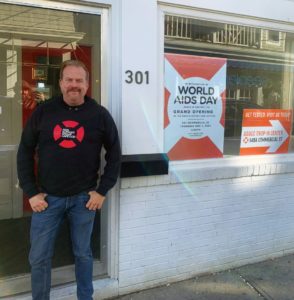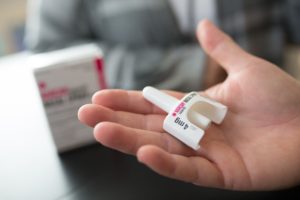PROVINCETOWN — On World AIDS Day this Dec. 1, the AIDS Support Group of Cape Cod (ASGCC) will open a drop-in center at 301 Commercial St. — that is, in the very middle of the hustle and bustle. At over 1,200 square feet, the center is about six times bigger than the group’s prior drop-in location, a former flower shop in Provincetown’s West End.
The group’s CEO, Dan Gates, says the new center is the result of two different trends. The encouraging one: the attitudes of gay men toward sexual health have undergone a sea change in the last 10 years, Gates said, with sexually transmitted infection screenings going from being seen as a shameful activity to something that “groups of guys will come in here for on their way to tea dance.”

Because HIV can also be transmitted by needles, however, the ASGCC has worked for decades on harm reduction and safety for intravenous drug users, where the trends are grim.
Fentanyl is in the drug supply on Cape Cod, Gates said, and overdoses can happen incredibly fast, knocking users unconscious and stopping their breathing before they have time to call for help.
Narcan, a drug that can reverse an overdose, is already free, but it needs to be administered quickly. For that reason, Gates said, it needs to be everywhere.
Fentanyl is not only in other opiates like heroin. It is now found in drugs associated with partying, including cocaine and crystal meth, Gates said. The AIDS Support Group plans to train restaurant owners, bartenders, hotel staff, and family members on the use of Narcan in the new drop-in center and give out free fentanyl test strips as well.
Ten years ago, the giant window at 301 Commercial St. would have been a problem, Gates said. The ASGCC offered HIV and sexually transmitted infection tests at a much more private setting then, tucked off Commercial Street in the East End.
Even now, not everyone will want to enter from Commercial Street, Gates said. The drop-in center will have another entrance at the rear of the building, facing the municipal parking lot.
Still, Gates sees the building as a sign of the times.
“I think, for the gay community, the way our sexual norms have changed in the last 10 years is staggering,” he said.
HIV had already become manageable with medications when PrEP, or pre-exposure prevention medication, was approved in 2012. The CDC now estimates PrEP to be 99-percent effective at preventing HIV transmission, with only four documented cases of transmission to people who were taking the drug regularly.
As the fear associated with a potentially lethal HIV infection has receded, gay men have become less ashamed about sexual activity and more businesslike about the other STIs, Gates said.
“We used to do 300 screenings in a year,” he said, each of which involved tests for chlamydia, gonorrhea, syphilis, and HIV. “In 2019, the year before Covid, we did that many screenings just in July.”
As the specter of HIV diminishes, “the moralism is removed,” Gates said. Sexual health screenings have become “maintenance” of well-being.
Narcan Everywhere
When it comes to fentanyl, however, Gates thinks both the gay and straight communities are underestimating the danger.
Drugs that are mixed with fentanyl can kill their users incredibly quickly, according to Eliza Morrison, a program manager in ASGCC’s Falmouth office. That is why Gates believes the fast-acting antidote Narcan needs to be widely distributed in the community to help rescue people who are dying of overdoses.

The drugs in which fentanyl is now appearing are not themselves new on Cape Cod. Heroin is a powerful sedative that already had the potential to knock people unconscious and suppress their breathing, and it has been a killer, especially of younger adults, for decades.
Stimulants like cocaine and methamphetamine are less likely to kill their users in a single overdose, although their effects on the body are still deadly over time.
Fentanyl, however, has altered the odds on all these drugs, Gates said. Overdose deaths have increased 50 percent in America just since the end of 2019, according to Centers for Disease Control data, and 70 percent of overdose deaths now involve fentanyl.
In 2021, overdose deaths nationwide passed the 100,000 mark. According to the New York Times, that means overdoses are now more lethal than car crashes, gun violence, or AIDS have ever been. The toll from overdoses last year was about one-quarter of that year’s deaths from Covid-19.
Because it blocks the receptors in the brain that opioids bind to, a dose of Narcan, delivered as a nasal spray, can counteract an overdose and restore the brain to alertness almost immediately, Morrison said. If someone is given a dose of Narcan but isn’t actually on opiates, it has essentially no effect.
Police officers and EMTs in all four Outer Cape towns already carry Narcan, Gates said, and last year the AIDS Support Group provided about 2,000 people with free doses through its Provincetown and Falmouth offices and its two mobile vans. Many of those clients also received fentanyl test kits, STI screenings, sterile supplies, and help arranging medical care.
Because there is so little time to rescue a person who has stopped breathing, however, Gates wants to use the new drop-in center to train a much broader slice of the community to recognize an overdose and administer Narcan, including hoteliers, bartenders, restaurant owners, and family members of people who use drugs.
“I think every business in town should have Narcan now, because fentanyl has just been sweeping the Cape,” Gates said. Knowing the difference between a customer who’s passed out from alcohol and one who is overdosing could save that person’s life.
Crisis Counselors
Gates is also hoping to use the new drop-in center as a space for crisis counselors. Offering such support at a sexual health center is not a new approach — after all, the nature of HIV testing is that sometimes a person will get bad news. Crisis or bridge counselors typically see a new client immediately after a crisis. They work with people for two to four months until a relationship with a long-term therapist can be arranged.
On the Outer Cape, where mental health specialists are in short supply, and waiting lists for care can be long, Gates thinks the AIDS Support Group should host such a program.
“We are hoping to introduce behavioral health services here to help address the shortage of support,” Gates said. “We don’t have the capacity to have five therapists with a full caseload. But we could do short-term bridge counseling here.”
As part of its five-year mental health plan, the town of Provincetown had discussed spending $264,000 per year on a crisis counseling program — but that was put on hold last spring.
Provincetown, Truro, and Wellfleet had been scheduled to discuss a regional approach to mental health needs at a joint meeting of the three boards of health on Dec. 7, but that meeting has been postponed, and a new date for it has not been announced.



